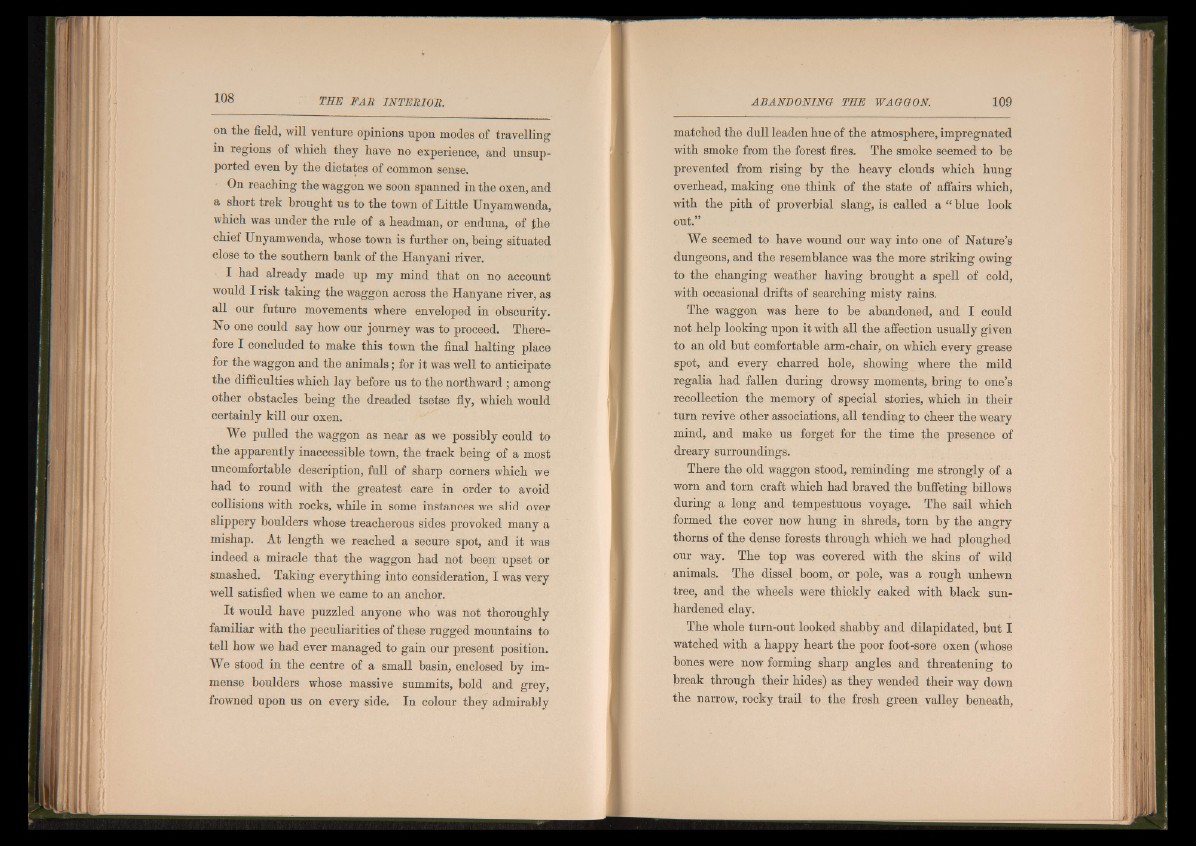
on the field, will venture opinions upon modes of travelling
in regions of which they have no experience, and unsupported
even by the dictates of common sense.
On reaching the waggon we soon spanned in the oxen, and
a short trek brought us to the town of Little TJnyamwenda,
which was under the rule of a headman, or enduna, of Jhe
chief Unyamwenda, whose town is further on, being situated
close to the southern bank of the Hanyani river.
I had already made up my mind that on no account
would I risk taking the waggon across the Hanyane river, as
all our future movements where enveloped in obscurity.
No one could say how our journey was to proceed. Therefore
I concluded to make this town the final halting place
for the waggon and the animals; for it was well to anticipate
the difficulties which lay before us to the northward ; among
other obstacles being the dreaded tsetse fly, which would
certainly kill our oxen.
We pulled the waggon as near as we possibly could to
the apparently inaccessible town, the track being of a most
uncomfortable description, full of sharp corners which we
had to round with the greatest care in order to avoid
collisions with rocks, while in some instances we slid over
slippery boulders whose treacherous sides provoked many a
mishap. At length we reached a secure spot, and it was
indeed a miracle that the waggon had not been' upset or
smashed. Taking everything into consideration, I was very
well satisfied when we came to an anchor.
I t would have puzzled anyone who was not thoroughly
familiar with the peculiarities of these rugged mountains to
tell how we had ever managed to gain our present position.
We stood in the centre of a small basin, enclosed by immense
boulders whose massive summits, bold and grey,
frowned upon us on every side. In colour they admirably
matched the dull leaden hue of the atmosphere, impregnated
with smoke from the forest fires. The smoke seemed to be
prevented from rising by the heavy clouds which hung
overhead, making one think of the state of affairs which,
with the pith of proverbial slang, is called a “ blue look
out.”
We seemed to have wound our way into one of Nature’s
dungeons, and the resemblance was the more striking owing
to the changing weather having brought a spell of cold,
with occasional drifts of searching misty rains.
The waggon was here to be abandoned, and I could
not help looking upon it with all the affection usually given
to an old but comfortable arm-chair, on which every grease
spot, and every charred hole, showing where the mild
regalia had fallen during drowsy moments, bring to one’s
recollection the memory of special stories, which in their
turn revive other associations, all tending to cheer the weary
mind, and make us forget for the time the presence of
dreary surroundings.
There the old waggon stood, reminding me strongly of a
worn and torn craft which had braved the buffeting billows
during a long and tempestuous voyage. The sail which
formed the cover now hung in shreds, torn by the angry
thorns of the dense forests through which we had ploughed
our way. The top was covered with the skin s of wild
animals. The dissel boom, or pole, was a rough unhewn
tree, and the wheels were thickly caked with black sun-
hardened clay.
The whole turn-out looked shabby and dilapidated, but I
watched with a happy heart the poor foot-sore oxen (whose
bones were now forming sharp angles and threatening to
break through their hides) as they wended their way down
the narrow, rocky trail to the fresh green valley beneath,